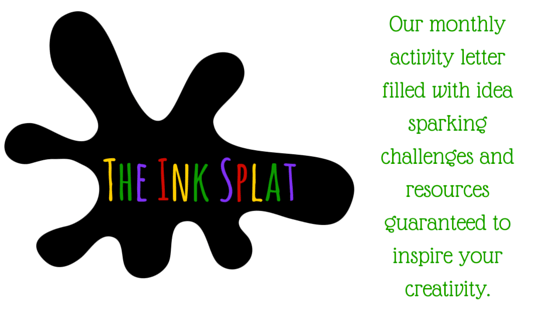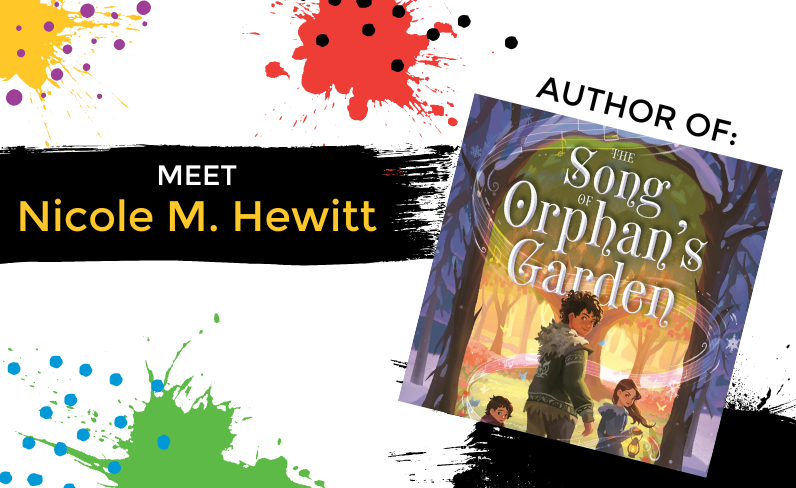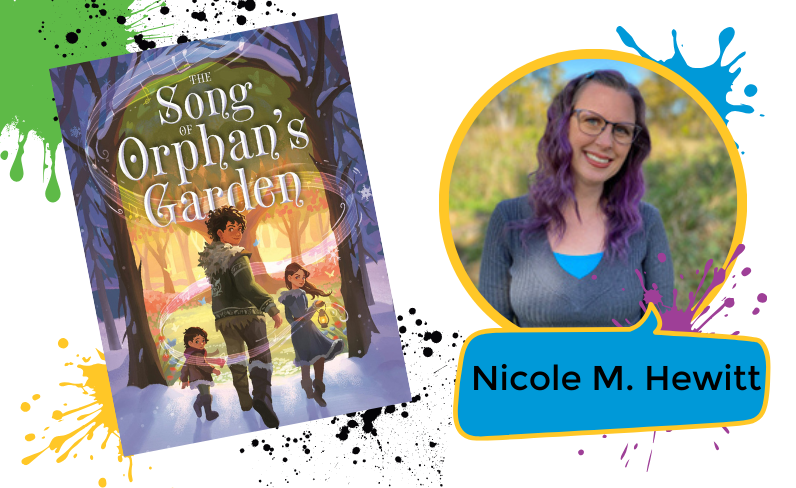Hello Inklings!
This month’s Ink Splat Author Interview features Nicole M. Hewitt, author of The Song of Orphan’s Garden, a lyrical fantasy written in verse
In our interview with Nicole, we talked about the challenges of building a fantasy world in a novel in verse and about the opportunities that writing a fantasy in this untraditional format also offers. We discussed her inspiration for the book, The Selfish Giant by Oscar Wilde, and we explored many other writing craft topics ranging from characterization, to poetic form, to how to work through creative blocks.
Learn more about Nicole at nicolemhewitt.com.

In our conversation with Nicole M. Hewitt, we discussed how one might use a fairy tale to inspire our own original writing.
PROMPT:
Choose a fairy tale you love. Take one scene from that story that stands out in particular. How might you write that scene in a story of your own imagining, in a completely new way? Maybe you take the scene where Cinderella tries on the glass slipper, but totally change the footwear into cowgirl boots, tennis shoes, or fuzzy slippers. What kind of world might this scene occur in? How might you make a few key changes to characters, setting, or plot points to make a scene that’s entirely your own?
A: When I was a child, I listened to a recording of “The Selfish Giant” by Oscar Wilde over and over again. The themes of this story and the image of a little boy crying in his one corner of winter while the rest of the garden is bathed in spring stuck in my head for a lifetime. Those themes and images eventually blossomed into this book.
Sharing the book with the world has been both rewarding and terrifying. You never quite realize how much of yourself you put into a book until other people are reading it. It’s incredibly exciting when you see someone’s thoughts on the book and you can tell they just “get it.” And getting to talk to kids who’ve read the book has been a highlight for me!
Q: Last month at Society of Young Inklings, you probably won’t be surprised to hear that we were talking about poetry for National Poetry Month. Talk to us about writing a novel in verse. Was that how you started creating this story? How do you think about the intersection of poetry and storytelling?
A: Writing this book in verse was less a choice and more what the story demanded of me. From the first moment I thought of the concept, it started writing itself in my head in poetry, and I never tried to write it any other way. I tend to write introspective stories, where the characters’ feelings are as important as (or possibly even more important than) what’s happening to them. The inner life of the characters is what comes most easily to me. And poetry works really well for helping the reader experience those emotions right along with the characters.
A: I have a few resources that I use often, especially when I’m exploring formal poetry (poems that have specific rules and structure). I often flip through The Teachers & Writers Handbook of Poetic Forms (edited by Ron Padgett) for inspiration. And then when I find a form I want to experiment with, I’ll Google it and find a few different sites that describe the form and give examples. Having multiple explanations and examples helps, especially with trickier forms with complex rules. Some of the sites I find myself on often are Poetry Foundation, Academy of American Poets, and Writer’s Digest, but there are lots of other resources out there too.
Rhyming dictionaries and a thesaurus are also great tools. My favorite online site for this is Word Hippo because it has many tools in one place (and I like the way their results are formatted). When I was first starting out, I didn’t use these types of resources much because it felt like I was “cheating,” but I’ve come to realize that using tools doesn’t stifle your creativity at all, but instead helps it flourish!
As far as helping my poetry flow or getting unstuck, I wish I had magic answers, but I don’t It’s all about playing with the language and revising, revising, revising until a poem feels right. When I’m truly stuck, sometimes that means I have to step away and work on something else for a while. Sometimes it means the form I’m using just isn’t right for the poem I want to write. Sometimes it means I need to brainstorm away from the paper (or computer) for a bit. And sometimes it means I need to use new or different tools to get the best results. I used an Excel spreadsheet to plan out the blitz poem in The Song of Orphan’s Garden (Brob’s poem called “What It Takes”). Usually spreadsheets are used for tracking data and numbers—who would ever think of using one for writing poetry?! But it worked!
A: Even though this book was initially inspired by the story “The Selfish Giant,” I was also heavily influenced by the state of the world as I was writing. I started writing in 2019, and it felt like our country (and our world) was more divided than ever. In a lot of ways, I was processing my feelings about those divisions and my hopes for a future where we can stop seeing people who see the world differently as enemies.
Not so much in The Song of Orphan’s Garden, but in some of my other works in progress I’ve also used inspiration from my family members and circumstances we’ve gone through. There are characters and story ideas all around us all the time!

A special thank you to Nicole M. Hewitt for sharing with us!
Nicole M. Hewitt is a middle grade author living in the Chicago suburbs with her husband, three grown kids, and two overly-enthusiastic pups. She hates to run, but she succeeded in finishing a marathon. (It was for a good cause!) She enjoys nature but doesn’t see nearly enough of it in Illinois, so her family travels as often as possible. She also loves to sing and can often be heard spontaneously composing incredibly profound songs about the fluffiest members of her family (the dogs, in case you weren’t sure). Her debut middle grade fantasy novel-in-verse, THE SONG OF ORPHAN’S GARDEN released in January of 2025 and was chosen as a Junior Library Guild Gold Standard Selection.
Nicole is represented by Deborah Warren at East/West Literary.
Check out The Song of Orphan’s Garden and all of our recent Ink Splat authors’ works at our Bookshop.org Store.

INKLINGS CONNECT
Looking for a Cozy Fall Read?
On the Inkwell, you'll find poems and stories by imaginative, passionate youth writers. Whether you're looking to laugh, to be swept away to a spectacular world, or moved to take hope-filled action in the real-world, there's something on the Inkwell for everyone.
Keep your creativity flowing with our upcoming community events:

SUBSCRIBE




